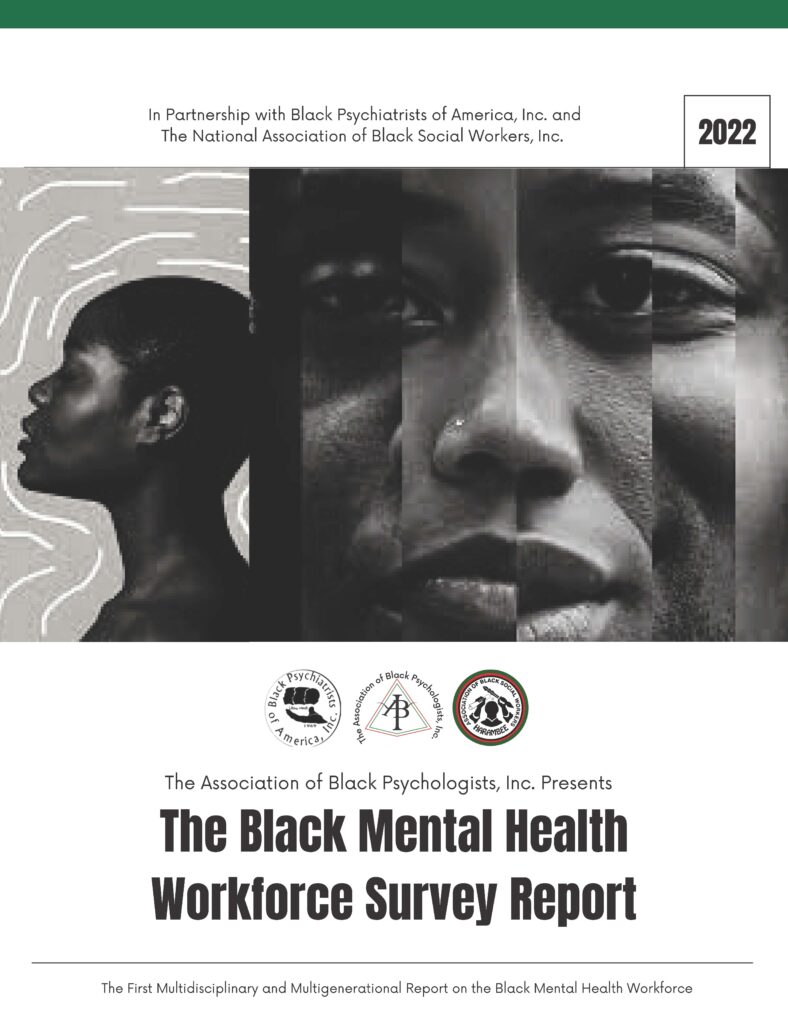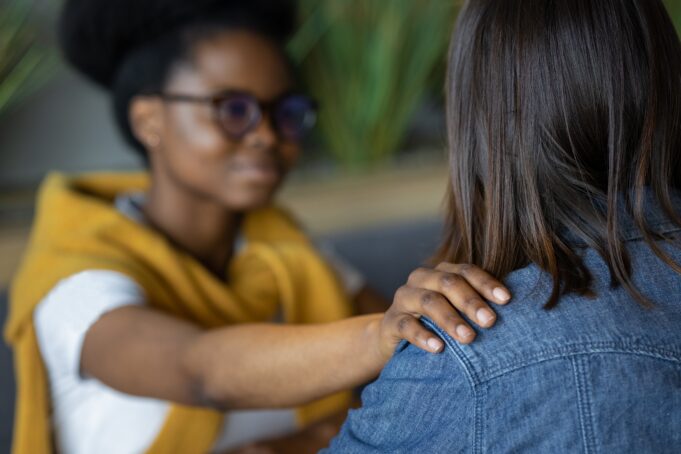There is a mental health crisis in Black communities among Black mental health professionals themselves, according to “The State of Black Mental Health Workforce Survey Report.”
The “syndemic” of COVID-19, racism, and economic oppression that came into focus in 2020 has heightened the crisis for Black mental health professionals and the people they serve, according to the survey, released earlier this year. A “syndemic” by definition is an epidemic that includes two or more concurrent or back-to-back epidemics, according to Behavioral Health Specialist Lanéay London, project lead and report co-author.
“But for African Americans, our ‘syndemic’ was the pandemic. Everybody goes into mental health crisis,” Ms. London told The Final Call. “You’re a servant, boots on the ground, you’re front line, as a person, as a professional, but the people you serve look like you,” she added.
Black mental health professionals were traumatized by the pandemic professionally— overworked and overstressed, observed Ms. London. They watched their mirror images meaning other Black folks—experience stress and trauma—as a secondary trauma. Then came a third layer, she explained.

“You’re at home, as a person, with your family, as a Black person watching all of this happen professionally, watching the police murder people that look like you, that act like your brother, look like your sister. We have a three-to-four-fold expression of trauma as a Black mental health professional and you’re working for a system that is apathetic to all of these things happening,” she stated.
As a remedy, the Association of Black Psychologists, Inc., launched the Sawubona Healing Circles for Black nurses and EMTs, because they were watching their people die, Ms. London said. The Sawubona Healing Circles are not therapy, but virtual spaces where participants learn ways to cope with racial stress, such as COVID-19 culturally-specific disenfranchisement, according to the organization. The report was released on January 13.
Fighting for respect while facing racism
According to the report, 28 percent of respondents said they thought about leaving the field in the last two years due to: burnout, low wages, increased workload, micro-aggressions and racism in the field, and personal mental health. Forty-one percent of respondents reported they did not receive training to work with Black clients. Of those who reported receiving training, 34 percent said that training was inadequate.
Saaudiah Muhammad is a therapist and Licensed Clinical Social Worker who is in the Nation of Islam. She has seen clients virtually since the start of the pandemic and told The Final Call she has experienced microaggressions and on one occasion, direct aggression from White counterparts. Though she addressed those incidences head-on, she said she felt uncomfortable from then on being around those individuals.
“It is an air from White counterparts as if you don’t belong in‘this’ space, yet, I would quickly remind them I not only belong and have a right to be in this space, but in fact, I am likely more qualified,” she stated.
Jean Muhammad’s experience as a pre-trial and post-conviction mental health clinician mirrors a bit of all the challenges expressed. Also, a member of the Nation of Islam, she is licensed in the state of Connecticut and hopes to be in private practice this year.
She loves the opportunity to help her predominantly Black and Indigenous clients, but the downfall are the micro-aggressions she faces as both a Black and Muslim woman, she told The Final Call. From consistently having to render her cellphone and other items to enter the same federal courthouse to work weekly for the last five months, when White lawyers and other White professionals do not, to continuously being asked if she would remove her head scarf (Muslim headwear or hijab), are a few micro-aggressions she has faced, according to Jean Muhammad.
“Why do I have to give them everything, to go through the metal detectors, and they just walk through? … That’s part of the discrimination I get on the legal aspect,” she stated. When she worked as an emergency mobile psychiatric counselor, she was asked repeatedly if she was credentialed or qualified to assess students in certain upper-echelon communities, she stated.
“When I go to certain areas of Connecticut like Westport, Southport, Stamford, the upper income, I’ve had to sit down with schools and speak with principals and psychologists. The first thing they want to ask me is how many credentials do you have? Do you have a master’s degree? Are you qualified to do this assessment on this young person?” she said. “I told them yes, I am qualified. If I wasn’t, I wouldn’t have been hired. And then I’d have to go and speak to the supervisor. … It’s like they think I’m lying,” Jean Muhammad said.
Recommendations and moving ahead
Meanwhile, the Black Mental Health Workforce report is historic because it’s the first multidisciplinary and multigenerational report on the Black mental health workforce, according to authors, who sought salient factors that present concerns, challenges, and barriers among them. The Association of Black Psychologists, Inc. (ABPsi), in collaboration with the Black Psychiatrists of America, Inc., and the Association of Black Social Workers, surveyed over 600 Black mental health professionals. This phase one report summarizes key issues driving the shortage of Black mental health professionals, identifies key challenges, and offers initial recommendations.
“The thing that stood out the most was Black clinicians were not being trained to help Black people,” continued Ms. London, citing the survey.
“The history of psychology in America has a very negative vibrational energy to it and our people are all about vibrations and energy and connectivity, so ABPsi, Black social workers, Black psychiatrists are here as an intermediary if we need the help, for our minds,” emphasized Ms. London. “Don’t make any mistake that we are just that strong, just that different. We need the help, but by people that understand us and that look like us to prevent re-traumatization,” she said.
“That is trauma-informed care for Black people because re-traumatization is putting you in front of a White clinician, and the White clinician telling you there’s something wrong with you, when it’s the system of so-called White supremacy that is causing the problems, and then telling you there is something wrong with you, instead of there’s something wrong with the system,” Ms. London continued.
Out of 648 responses from mental health professionals, primarily in the continental U.S., nearly half (45 percent) who responded were ages 25-45, and 38 percent were 46-65. Across all groups, respondents identified student loans as their primary challenge.
Unlike other reports, this report intentionally centers the voice of Black mental health professionals through direct quotes on the problems and solutions, according to its authors.
“There is a lack of representation of clinicians of color, particularly Black male clinicians. The workforce lacks diversity, and it is difficult to find clinicians of color in private practice who can serve the demand of clients who need services. There are many imbalances in the workforce that are not being addressed … the space is underserved and under-supported,” said one respondent.
“Anytime you have a righteous Black man in a position where he’s in a helping field is a positive thing to me, whether he’s a teacher, social worker, medical professional, psychologist, psychiatrist, clinical social worker, anywhere in the community, human services,” stated Michael “Mtumishi” Guynn, national treasurer for the National Association of Black Social Workers.
Having a male figure doesn’t mean female professionals don’t have power, but the response is a bit different, particularly when dealing with a Black male child, Mr. Guynn said.
Healing, unity and self-improvement
Saaudiah Muhammad spoke on the issue of the lack of Black therapists. “For many, it is vitally important to have a clinician of color. From what I have experienced, from my Black clients, most who have had a White clinician, reported that it was not the best experience and overall, not a good fit,” she said. “I have noticed a major increase in persons seeking therapy services since the start of the pandemic,” Saaudiah Muhammad added.
Another survey respondent said it’s important to recognize that simply increasing the number of Black mental health professionals is not enough: “The healing needed in our communities comes from challenges outside the medical model proposed by mainstream psychology. There is no critical number of [mental health professionals] that will change problems in housing, food, policing, poverty, etc., unless we begin forging connections with entities fighting against these.”
That will take working toward unity in order to begin to help and heal one another. The Most Honorable Elijah Muhammad, Eternal Leader of the Nation of Islam taught that one of the gravest handicaps among Black people is that there is no love for self or his or her own kind, which is the root cause of our disunity, disagreements and fighting among one another.
He taught in His book, “Message to the Blackman in America,” that Black people have been under the influence of Caucasians and “fell into the hands of the slave-masters, who have robbed, spoiled, wounded and killed them.” He taught that Allah (God) came Himself to resurrect, heal and restore the Black man and woman.
His National Representative, the Honorable Minister Louis Farrakhan has often spoken on the trauma that has impacted Black communities and the need to get to the root of that trauma. The Minister developed a course of study titled, “Self-Improvement: The Basis for Community Development,” designed to produce self-examination, self-analysis, self-correction and to quicken in each person, the self-accusing spirit.
“Overcoming Difficulty,” “Building the Will,” “The Struggle For Balance,” “Building Human Potential,” “The God Within,” and “The Four Great Impediments To Self-Development,” are just a few of the topics addressed in The Study Guides.
You may contact your physician, the Association of Black Psychologists at https://abpsi.org for additional information regarding mental and emotional health resources or assistance.













